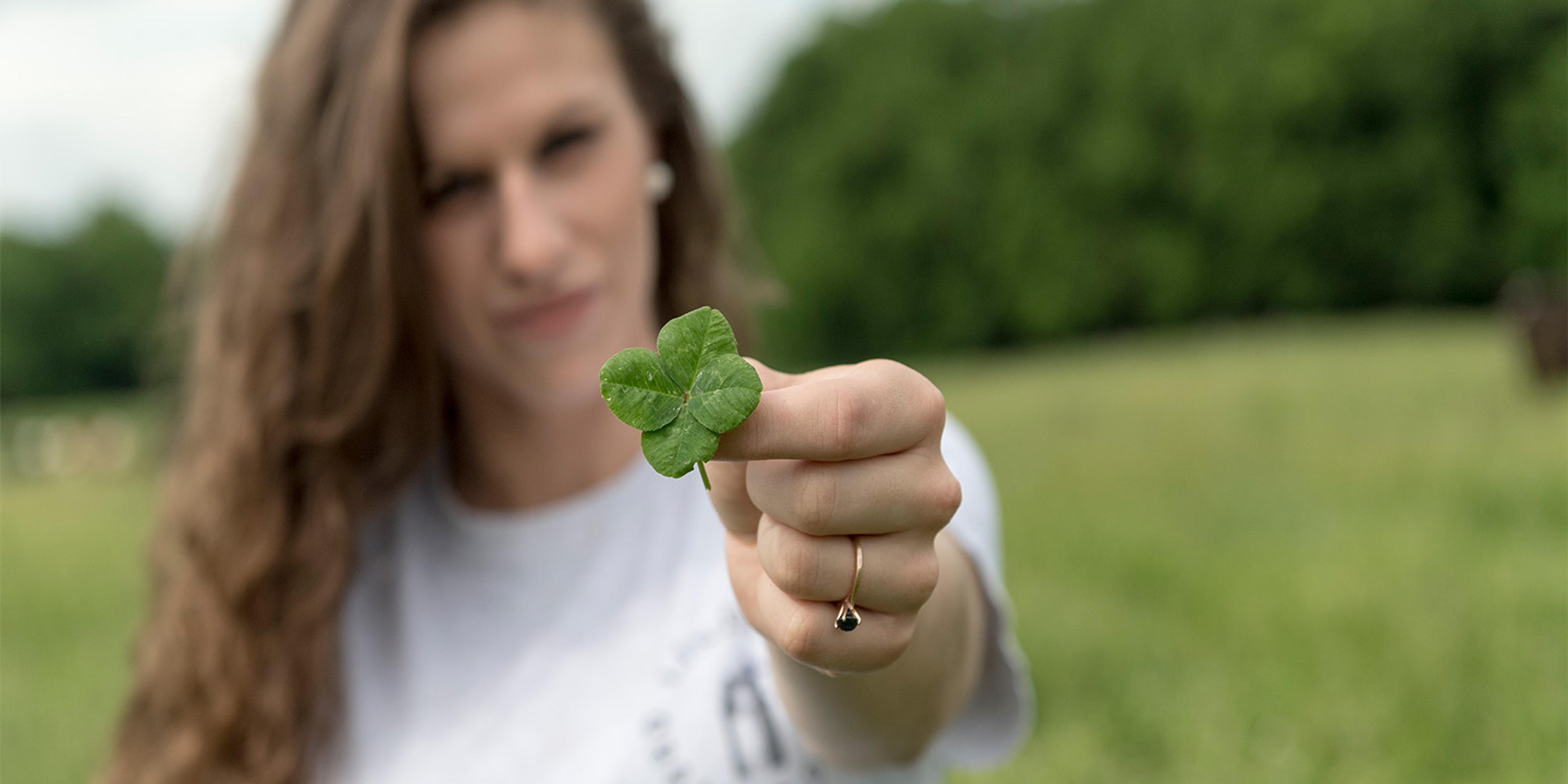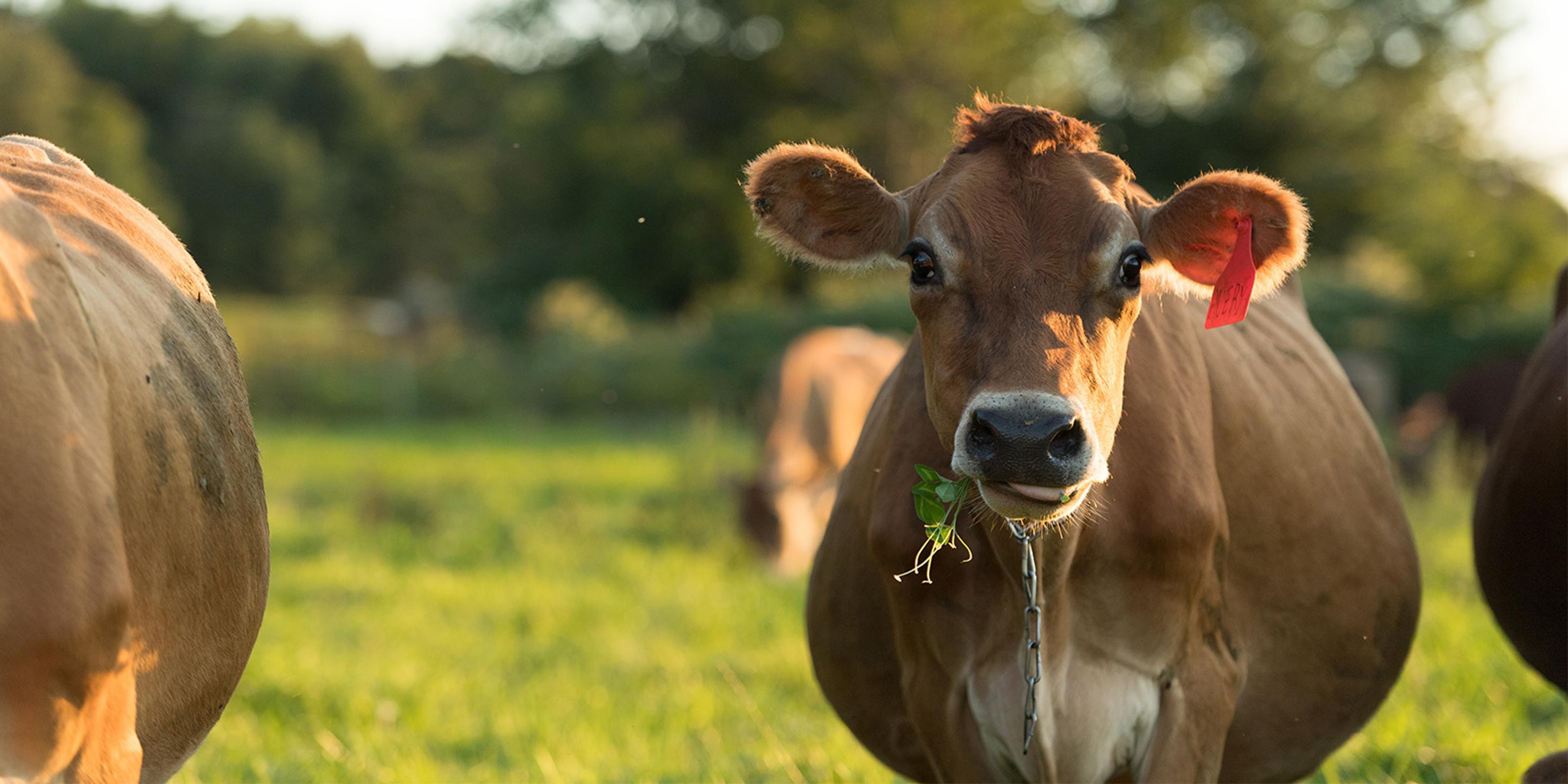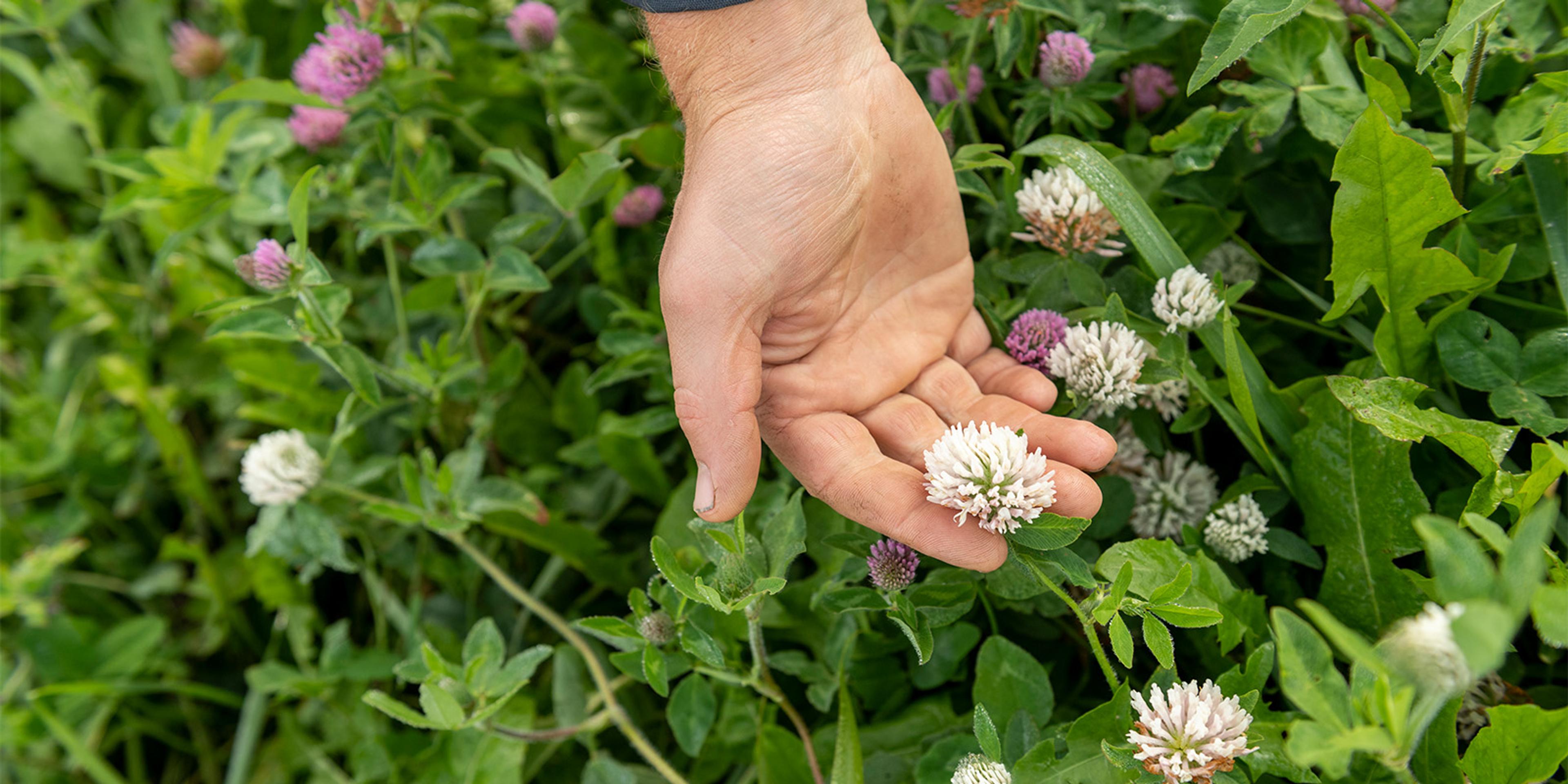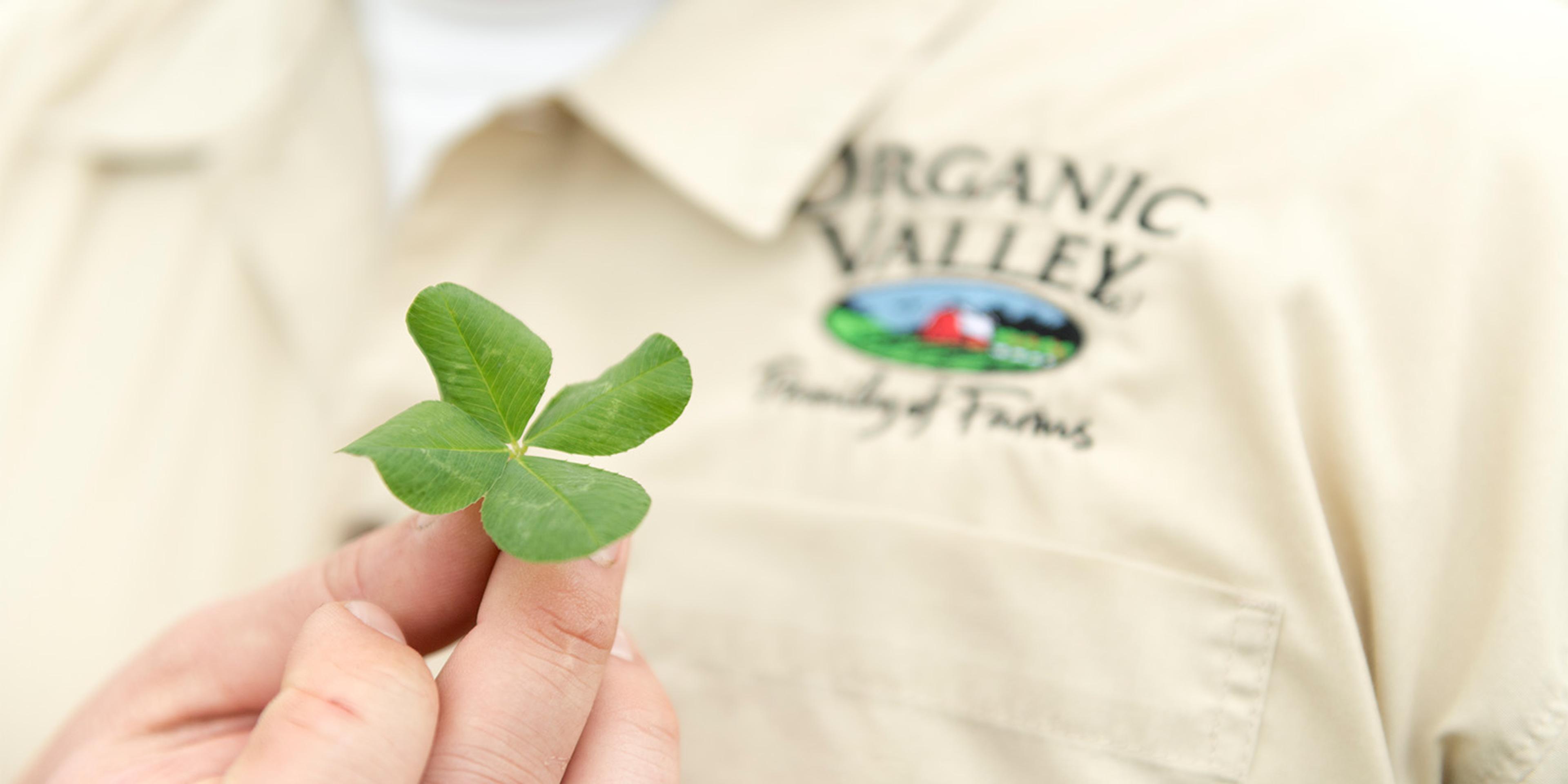
Earth
Lucky Clover for Cows, Ecosystem and Insects
Organic Valley cows spend their days in fields of clover and lush grasses — how lucky is that!
Does luck cross your mind when you envision a clover? It likely does when you find a four-leaf clover, but there is much more than luck in a clover — these perky legumes benefit soil, are a treat to cows’ taste buds and make a pleasant name.

A dairy cow munches on fresh clover at Stony Pond Farm in Vermont.
Clover for Cows
“Cows absolutely love clover,” said Jeff Miller, an Organic Valley farmer from Ohio. “It’s probably their favorite. If cows have a choice of white clover or a nice patch of grass, they’ll likely go for the clover.”
Organic Valley cows spend a lot of time amongst clover and other greens. Organic certified cows are required to spend more than 120 days annually on pasture, but Organic Valley cows spend about 50% more time on grass than the organic requirement! That’s a lot of time to eat a lot of clover.
Along with other forages, about 10 varieties of clover can be found on Organic Valley farmer-member Jordan Settlage’s Ohio farm. The legume can reseed itself (produce seeds without human intervention) and is chock full of protein, he said. The cows on his farm are as fond of clover as he is.
Did you know people can eat clover, too? It’s not just for cows. Settlage enjoys the sweet taste of the blossoms. He taste tests all grass and clover varieties on his organic pastures. Clover is edible from root to blossom, can be eaten raw or sauteed and makes for an eye-catching plate garnish. Clover is rich in antioxidants and has been used in traditional medicine.

Clover abounds at the Johnson family farm in Wisconsin.
Clover Benefits Biodiversity
Clover is a treat for cows, and cottontail rabbits and birds also love it, Miller said. The forage quality of clover flowers is excellent and attracts a number of beneficial pollinating insects like bees and butterflies. Clover “fixes nitrogen” naturally from the air and improves soil to feed other plants — nitrogen is an essential nutrient for sustaining life on Earth!
Some people consider clover a nuisance weed in lawns, but it’s time to rethink this. Clover is not just for pastures, and it’s easy to grow. (If you are interested in helping native pollinators, you may want to consider transforming your lawn into a bee lawn.) In fact, clover can help other things grow from the nitrogen it sinks into the soil!
Along with promoting biodiversity, because it fixes atmospheric nitrogen, clover acts as a built-in fertilizer and helps prevent soil erosion from runoff and wind. Organic Valley is passionate about natural fertilizers, not chemical fertilizers. In fact, certified organic means no chemical fertilizers are allowed. Everything our cows eat is certified organic, which means absolutely no antibiotics, synthetic pesticides or GMO anything. And Organic Valley farmers have kept 540 million pounds of chemicals off the land since 1988!
What does clover do to cows? Clovers mixed with grasses improve animal performance, increase the nutritional quality of pasture and extend the grazing season, according to the University of Kentucky.
Simply put, clover helps feed the soil that feeds the plants which feed the cows that feed you and your family. It’s the circle of life.

See those little blossoms among the grasses at Randall Bates’ dairy farm in Maine? That is red clover and white clover.
Cows, Kids and Farms Named Clover
Several Organic Valley farmer-members have cows named Clover, but the name reaches beyond our animal friends. “Clover” is used as a farm name, and you may even come across people named Clover.
The baby name “Clover” has gained popularity over the past few decades in the U.S. In 2021 there were about 320 babies named Clover. That same year, name experts predicted Clover would be one of the top 10 names to explode in popularity over the next five years. We’ll keep an eye on that.
But let’s get back to cows named Clover. Organic Valley farmers appreciate the cows on their farms and often name them. All cows are different and special, and many of their names are special, too. Miller had a cow named Clover when he was younger, and a cow named Clover makes her home on Settlage’s farm now.
Check out this video of the sassy cow named Clover.
Clover on Settlage’s farm is not what you picture when envisioning a sweet cow moseying around a field munching on greens. The “independent leader,” as Settlage describes her, bosses pasture mates around. Clover has loveable traits, but she has led other cows astray — jumping around and going beyond where they are supposed to. Her hair is shaggy and she “hires” cows to nurse her babies. When they aren’t nursing to Clover’s standards, she lets them know.
Are Four-Leaf Clovers Lucky?
Four-leaf clovers are a symbol of good luck in Irish and Irish-American cultures. The four leaves are said to stand for faith, hope, love and luck. Children in the Middle Ages believed they could see fairies if they carried a four-leaf clover. Four-leaf clovers were also Celtic charms thought to provide magical protection and ward off bad luck.
One out of 10,000 clovers have four leaves, according to Scientific American. If you find one, you may find more in the same area. Four leaves is a genetic mutation, so there is a chance that mutation is in neighboring clovers too.

A lucky find at the Teagues’ organic family farm in North Carolina.
Of course, the more clover you have in your yard, the better your odds of finding one with four or even five leaves.
Whether or not you believe in the power of four-leaf clovers, setting down the phone, sitting in grass and searching for the elusive clover is a nice way to get outside and just be.
Both Settlage and Miller have idly looked for four- (and five-) leaf clovers, but not in an attempt to find a little luck.
“I consider myself blessed regardless if I find a four-leaf clover or not,” Miller said.
An antique typewriter fanatic and chicken mom who treasures time outdoors admiring all that nature has to offer, Jennifer McBride is Rootstock’s editor. McBride spent 15-plus years as a journalist and newspaper editor before finding her niche with the nation’s leading organic dairy cooperative. Contact her at Rootstock@organicvalley.com.
Related Articles
- Tags:
- climate,
- environment,
- grass-fed,
- pollinators,
- soil health & science,
- biodiversity


















